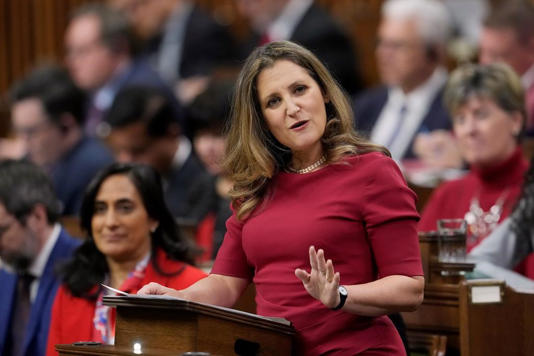
The federal government will table its 2024 budget on April 16, Deputy Prime Minister and Finance Minister Chrystia Freeland says.
Freeland said in a news release Monday the budget will be released at 4 p.m. Eastern that day.
“Our economic plan is about building more homes, faster, making life more affordable, and creating more good jobs,” she said.
“This plan will unlock pathways to a good middle class life for the next generation—because Canada is stronger when everyone has an equal chance to succeed. Together, we are going to unlock and build a brighter, more prosperous future.”
While Freeland’s statement provides an idea of what challenges the government wants to address, internal government polling obtained by Global News last year found nearly 60 per cent of Canadians believe Ottawa should balance the budget.
The polling, which included data from July to October 2023, found barely one in four believe the government should reduce overall spending, and it showed strong support — 42.5 per cent — to increase spending on housing, even if that means rising deficits.
The results also showed strong approval for boosting income support programs for low-income Canadians with disabilities, as well as for the national dental care program, a key demand of the supply-and-confidence agreement that the NDP signed with Prime Minister Justin Trudeau’s minority Liberal government.
Video: Trudeau ‘optimistic’ BoC will bring down interest rates this year
Meanwhile, even though the country’s military leaders have been loudly warning that the Canadian Forces do not have adequate equipment or personnel, the government’s internal polls show there are low levels of support for increasing defence spending.
The polling data was obtained by Global News through federal access-to-information laws. The data is from the weekly polling program conducted by the Privy Council Office, the bureaucratic department tasked with supporting the Prime Minister’s Office.
It all adds up to a complex political picture for Freeland, who must respond to apparently contradictory desires of an electorate that seems to value current levels of government spending, yet seeks return to balanced budgets, something that would be possible only with tax increases, spending cuts or a combination of both.
The government polled on that last point, and found 54 per cent of respondents agreed with the statement: “I worry that if the federal government quickly tries to balance the budget it would mean either cuts to essential services or higher taxes.”
Opposition Leader Pierre Poilievre has vowed to balance the budget if the Conservatives win office, though he has yet to provide details as to how that would be achieved.
Goldy Hyder, president and CEO of the Business Council of Canada, said in a statement on Monday the upcoming budget must prioritize economic growth.
“The government has an opportunity to implement growth policies, including many of its own previous commitments, without putting an unfair financial burden on future generations,” Hyder said.
“This approach will ensure the long-term viability of our cherished social programs and living standards, while allowing Canada to compete and succeed on the world stage.”
— with files from David Akin
Source: Source: Global News






